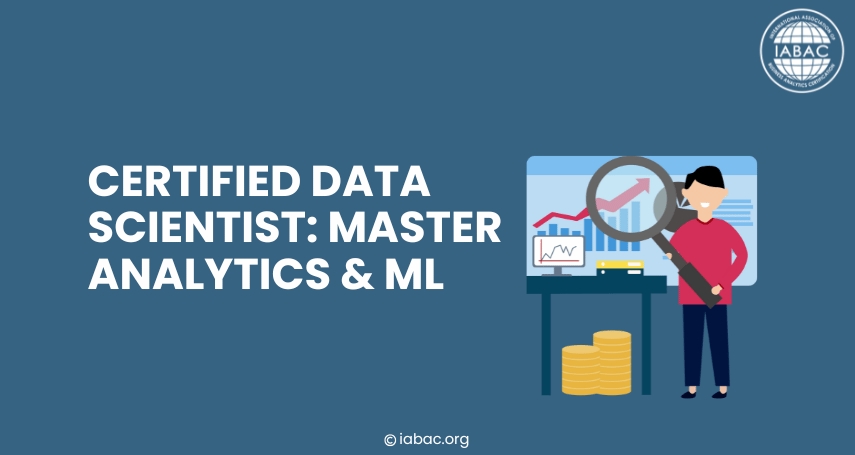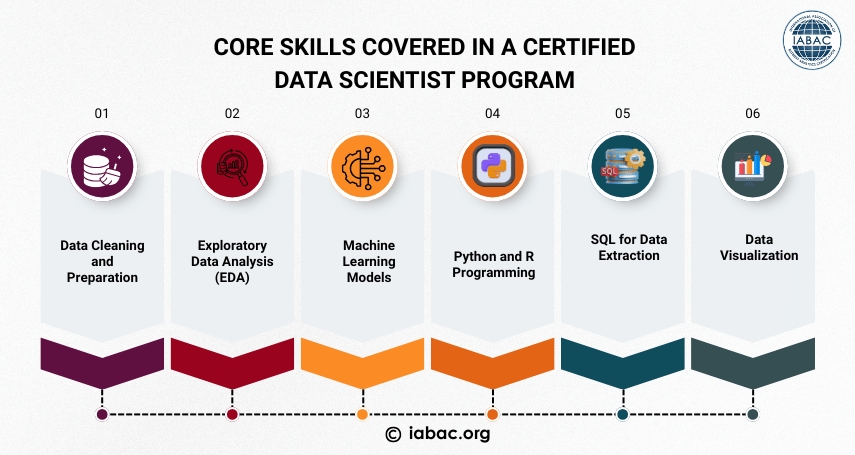
A Certified Data Scientist is a professional trained to analyze data, build predictive models, and uncover insights using advanced tools and techniques in data science and machine learning. This certification validates expertise in handling large datasets, applying statistical methods, and utilizing technologies such as Python, R, and SQL. With growing demand across industries, becoming a Certified Data Scientist opens doors to rewarding careers in finance, healthcare, technology, and more.
What Is a Certified Data Scientist?
A Certified Data Scientist is a professional who has proven their ability to analyze complex data, build predictive models, and deliver meaningful insights, all validated through a recognized certification program. This credential confirms both technical skills and real-world understanding of data science applications.
Here’s what defines a certified data scientist:
Technical proficiency: Skilled in tools like Python, R, SQL, and machine learning frameworks
Business insight: Understands how to turn data into practical strategies and decisions
Project experience: Trained through real-world case studies and hands-on projects
Validated expertise: Certification confirms knowledge that meets industry standards
Communication skills: Can present insights clearly to both technical and non-technical audiences
Why Pursue a Data Science Certification?
A Data Science Certification offers more than just a credential. It provides structured learning, practical experience, and validation of your skills in one of the most in-demand fields today. Whether you're entering the job market, transitioning to a new career, or seeking growth in your current role, certification can significantly enhance your confidence and credibility.
Key reasons to pursue a data science certification:
Builds a strong foundation: Learn essential concepts like statistics, data wrangling, data visualization, and machine learning
Hands-on experience: Work on real-world projects that simulate industry scenarios and help you apply what you’ve learned
Boosts your resume: Certified professionals stand out in competitive job markets and often land interviews faster
Bridges skill gaps: Ideal for professionals from non-technical backgrounds looking to move into data-driven roles
Prepares for advanced roles: Unlock opportunities as a data analyst, data scientist, machine learning engineer, or AI specialist
Certified Data Scientist in Finance: A Growing Niche
The financial industry is increasingly utilizing data science to support informed decision-making, manage risks effectively, and enhance customer services. A Certified Data Scientist in Finance combines analytical skills with financial knowledge to address challenges such as fraud detection, investment analysis, and credit risk assessment.
Why this niche is growing:
High data volume: Financial institutions deal with large amounts of transactional and market data
Risk and compliance needs: Data scientists help identify patterns and anomalies to support regulatory compliance
Better decision-making: Predictive models are used to forecast trends, assess creditworthiness, and optimize investments
Automation in finance: AI tools are being applied to areas like trading, underwriting, and customer support
Core Skills Covered in a Certified Data Scientist Program
A Certified Data Scientist program equips learners with a solid mix of theoretical understanding and practical experience. These programs are designed to prepare individuals for real-world data challenges across various industries by covering key tools, techniques, and methodologies.
Here are the core skills and topics typically included:
Data Cleaning and Preparation: Learn how to handle missing values, correct data formatting, identify outliers, and ensure data quality, crucial for accurate analysis.
Exploratory Data Analysis (EDA): Understand how to explore datasets using visualizations and statistical summaries to uncover trends, patterns, and relationships.
Machine Learning Models: Develop predictive and descriptive models, including linear and logistic regression, decision trees, clustering, and neural networks.
Python and R Programming: Use programming languages to automate data tasks, create machine learning models, and develop scalable data workflows.
SQL for Data Extraction: Gain proficiency in querying databases to retrieve, filter, and manipulate structured data for analysis.
Data Visualization: Use tools like Tableau, Power BI, Seaborn, and Matplotlib to communicate insights clearly and effectively through dashboards and visual reports.
Big Data Technologies: Get introduced to big data tools such as Hadoop and Apache Spark, and understand how cloud platforms like AWS, Azure, or Google Cloud support large-scale data processing.

Top Certification Programs to Consider
Choosing the right data science certification depends on your career goals, learning style, and industry preference. Here are some recognized programs that offer strong foundational and practical skills:
IABAC – Certified Data Scientist: Offered by the International Association of Business Analytics Certification, this program is aligned with the European framework and emphasizes practical, project-based learning. It covers Python, machine learning, EDA, and model deployment, making it ideal for beginners and professionals looking to validate their expertise.
Google Advanced Data Analytics Certificate: Focuses on real-world case studies, business problem-solving, and tools like Python and Tableau. Suitable for those aiming for analyst roles.
Microsoft Certified: Azure Data Scientist Associate: Best for those who want to specialize in deploying machine learning models on cloud platforms using Microsoft Azure tools.
Factors to Consider When Picking a Data Science Certification
Selecting the right data science certification can shape your learning journey and career direction. The best choice depends on your background, goals, and preferred learning style. Keep these factors in mind:
Your Experience Level: If you’re new to data science, start with beginner-friendly or foundational programs. Experienced professionals can explore advanced or specialized certifications in areas like finance, AI, or big data.
Program Content: Check if the course covers essential tools and skills such as Python, R, SQL, machine learning, and data visualization that align with the roles you're aiming for.
Industry Recognition: Choose a certification that’s respected by employers and recognized across industries. Certifications from organizations like IABAC or platforms like IBM and Google are widely acknowledged.
Flexibility and Format: Online, self-paced programs are ideal if you're balancing work or other commitments. Some also offer live sessions, mentoring, or project-based learning.
Cost and Return on Investment: While some programs may have a higher price tag, many offer payment plans, scholarships, or strong career support. Evaluate the value based on what you’ll gain in skills, credentials, and job opportunities.
What to Expect After Becoming a Certified Data Scientist
Earning a data science certification opens the door to a wide range of professional opportunities. Whether you're switching careers or leveling up, here’s what you can typically expect:
Improved Job Prospects: Certified data scientists are in demand across industries like finance, healthcare, retail, and tech. Your credentials signal to employers that you have practical, job-ready skills.
Access to Specialized Roles: With certification, you're qualified for roles such as data analyst, machine learning engineer, or business intelligence specialist.
Better Earning Potential: Certifications often lead to higher salary brackets, especially when combined with experience and project work.
Greater Confidence in Projects: You’ll be equipped to handle real-world data challenges, from cleaning messy datasets to deploying predictive models.
Continuous Learning Opportunities: Many certified professionals continue learning through advanced certifications, industry events, or hands-on work with emerging technologies.
Becoming a Certified Data Scientist is a smart career move in today’s analytics-driven economy. Whether you’re interested in general data science or a focused role like a certified data scientist in finance, the right data science certification equips you with in-demand skills, practical experience, and industry recognition.
